Immigration
On Thursday, Dec. 11, a man dismantled a nativity scene depicting Immigration and Customs Enforcement arresting the Holy Family at a Charlotte church. The now-viral video depicts the man knocking over the mannequins in ICE uniforms who appear to be detaining a kneeling Mary and Joseph.
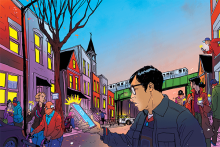
AS ORGANIZERS IN her city began preparing for the No Kings protest in October 2025, Erin Groble thought seriously about whether she should attend. On the one hand, she felt the need to do something. She was raised Lutheran and attended the Jesuit Loyola University in Chicago, and the increased presence of federal agents in Chicago challenged her to figure out what it meant to love her neighbor. On the other, she was genuinely scared at the possibility of being physically harmed or getting into conflict with authorities.
“I realized it just wasn’t really authentic to who I was. It just didn’t feel like the right thing for me to do,” Groble told Sojourners. “But then I started thinking, ‘OK, well, what is the right thing for me to do?’”
Groble was already part of a group chat organized by Brendan Curran, a Catholic priest and community organizer with The Resurrection Project. Curran had brought her block about 50 yard signs advertising “Know Your Rights” information via QR codes. Groble and her neighbors had planted a few of the signs, but there were plenty sitting in her neighbor’s home. “Yard signs are kind of hard to put up—especially in the city!” Groble said. “You have to find a place to put them; there’s a lot of concrete here and a lot of the soil is compacted. So, you need a lot of determination. I just went on my normal walking route, and in front of schools, by parks, by bus stops, I put them all up.”
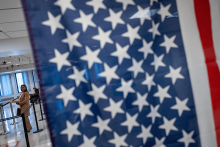
In late November, a child care worker at The PLACE, a refugee center in Amarillo, Texas, reported to work with a worried look on her face. She asked Brady Clark, whose community development nonprofit helps run The PLACE, if the latest announcement from the Trump administration would affect her family. She was referring to a memo from U.S. Citizenship and Immigration Service announcing it would re-interview all refugees admitted under President Joe Biden and beyond—an estimated 233,000 people.
The USCIS memo, dated Nov. 21, said the agency will terminate the refugee status of people already in the U.S. if they are found not to meet refugee criteria. The memo claims the Biden administration potentially prioritized expediency, quantity, and admissions over quality interviews and detailed screening and vetting.

The early seasons of Stranger Things hit different in 2025. I realized this as I rewatched the series ahead of the final season’s premiere. Watching federal agents sow mistrust and harm children no longer seems like a sci-fi nostalgia trip, and the creeping evil influence of the Upside Down feels more like commentary on current events than a Stephen King pastiche. In fact, in fighting for the world they want and practicing radical solidarity, the kids in Hawkins, Ind., teach us exactly the lesson we need for right now. Stranger Things might even be a modern-day parable.
When the show debuted in 2016, it was a smash hit and proved that Netflix could compete in the original-content arena. Following a group of teenagers and the adults they trust in a fight against the forces of evil, the show owes much of its success to ’80s nostalgia. The group has fought various monsters over its seasons, many of which took cues from Dungeons & Dragons, but Season 4 took a more psychological turn, focusing on a being that feeds on the ongoing trauma people in Hawkins have experienced in their personal lives.
In early November, Democrats won several key elections up and down the ballot in states like Virginia, Georgia, Pennsylvania, and, perhaps most notably, in New York, where Zohran Mamdani became the first Muslim, South Asian, Democratic Socialist mayor-elect in New York City’s history. For voters concerned about the Republican Party’s authoritarian lurch, it was a reminder that political wins on the left are still possible.
On Nov. 14, more than 100 clergy gathered to raise their voices to demand the closure of the Immigration and Customs Enforcement processing facility in Broadview, Ill., the release of all detainees, and that the Department of Homeland Security honor federal law by allowing detainees spiritual care.
Chicago is in a state of holy rage. Last Friday morning, I stood with many of my colleagues in ministry at a multifaith service outside the Immigration and Customs Enforcement processing facility in Broadview, Ill. It would be better to call this facility an abduction center, as those who are detained there have little to no contact with the outside world.
Working at a peacebuilding organization during times of war, genocide, and political upheaval is a strange kind of calling. At Telos, where I serve as director of marketing and communications, our mission is to equip communities to be peacemakers—working across lines of difference to help all people live in safety, freedom, and dignity.
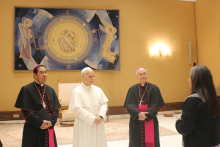
As President Donald Trump ordered federal troops into Chicago to assist with deportation efforts, immigrants and their advocates found an ally in Pope Leo XIV. A native of the city, the new pope urged U.S. bishops to confront the government’s escalating targeting of migrants.
After a private audience with Catholic leaders from El Paso, Texas, at the Vatican, on Oct. 8, Leo said he would like the U.S. Conference of Catholic Bishops to issue a formal statement. His appeal followed recent comments questioning the consistency of some American Catholics’ moral stances: “Someone who says that ‘I’m against abortion, but I’m in agreement with the inhuman treatment of immigrants in the United States,’ I don’t know if that’s pro-life.”
Alongside Bishop of El Paso Mark J. Seitz, Hope Border Institute, a grassroots organization rooted in Catholic social teaching, presented the pope with a stack of letters from immigrant community members. The letters expressed both the worries and hopes of migrants in today’s political climate and were received with emotion, said Astrid Liden, Hope’s communications officer.
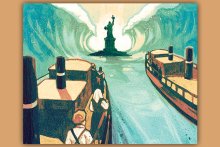
I WRITE THIS month’s reflections with a heavy heart as the federal government’s violent attacks on immigrants continue. As a Korean-descent immigrant, I understand how scapegoating, hatred, and being blamed for things beyond our control can be exhausting for body and soul. Our communities are on the brink of despair; our hopes for a better future are shattering.
And yet, we hold on to our faith. We know we are not alone. God is our refuge. We have friends, colleagues, and neighbors who are in solidarity with us and who pray for us. As we face lawlessness geared with imperial might, we believe that our God, the only true “king,” will “judge between the nations” and “settle disputes.” Then we will beat “swords into plowshares” and “spears into pruning hooks.” God is the ultimate judge of all (Isaiah 2:4).
The transformative path of Zacchaeus inspires me. His story is a model of faithfulness. Whether or not you claim Jesus as your savior, I believe that you can change by caring for the poor and oppressed, participating in reparations, and sharing your abundant gifts. After all, the gospel says so.
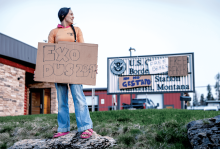
The upper northwestern corner of Montana has the fastest growing “micropolis” in the U.S. We had a large influx of Venezuelan immigrants, and there are a lot of Mexican workers as well. In 2021, we formed Valley Neighbors to assist refugees and immigrants with housing and other needs.
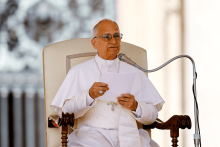
Pope Leo on Tuesday appeared to offer his strongest criticism yet of President Donald Trump’s hardline immigration policies, questioning whether they were in line with the Catholic Church’s pro-life teachings.
“Someone who says I am against abortion, but I am in agreement with the inhuman treatment of immigrants in the United States, I don’t know if that’s pro-life,” the pontiff told journalists outside his residence in Castel Gandolfo.
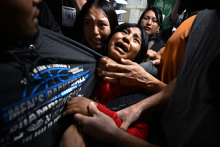
Last week the Trump administration announced Operation Midway Blitz, which extends the surge of ICE agents sent to Los Angeles and Washington, D.C., into Chicago; additional ICE surges are happening in Boston and are planned for Memphis. This increased ICE activity follows an alarming Supreme Court shadow docket ruling that permits the administration to stop people on the basis of personal appearance, language, or type of employment. In other words, racial profiling is now explicitly permissible for immigration officials.
If your life is proceeding basically as normal—school drop-offs, daily commutes, medical appointments, visits with grandchildren, stressful jobs, or the daily rhythms of life—it can be hard to remember the fear that many of our immigrant neighbors now feel. Despite my job leading a social justice organization, I’ll confess that I’m not immune from the temptation myself.

A federal judge has ordered the closure of the notorious immigration detention center known as “Alligator Alcatraz,” citing environmental violations and opposition from the Miccosukee Tribe. Progressives are celebrating this as a significant triumph for Florida’s Everglades, Indigenous communities, and the migrants who have endured the detention center’s conditions. But is this court ruling truly the sweeping victory that advocates claim?

Immigrants are being disappeared. Journalists are being threatened. Protesters are being criminalized. The poor are abandoned. The sick are left behind. Wars still rage. Democracy is crumbling.
The world feels increasingly precarious, and various crises are compounding and multiplying. What moral responsibility do religious institutions—especially seminaries—have at this time?
The verse that radicalized me will be a familiar one to Sojourners readers. It can be found in Matthew 25: “The King will reply, ‘Truly I tell you, whatever you did for one of the least of these brothers and sisters of mine, you did for me.’”
“Radicalization” is a popular topic. When I say I have been radicalized, I don’t mean that I’ve been shaped by a rigid set of beliefs that draws hard lines between who’s in and who’s out. I mean that I’ve been transformed by the teachings of Jesus, which challenge me to practice a radical form of love for others.
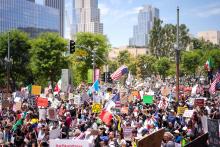
During the first week of June, aggressive Immigration and Customs Enforcement raids in and around Los Angeles sparked protests. To quell these protests, President Donald Trump deployed the National Guard and the Marines to the city. The federal escalation seems intentionally frightening; editor at large and founder of The 19th Errin Haines described the situation as a “public and excessive show of force …[as] a means of reinforcing control.” As the situation continues, we can anticipate further conflicts over control of the military and other shocking acts like the aggressive removal and detainment of Sen. Alex Padilla (D-Calif.), who was removed from Homeland Security Secretary Kristi Noem’s press conference on June 12 while peacefully attempting to ask questions.
I live in LA, and I think what is happening in our city is also happening across the country.
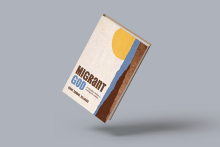
Isaac Villegas' evocative book opens in the Southwest desert along the borderlands of the U.S. and Mexico as a group of people leave crosses in the places where migrants have lost their lives. These crosses, writes Villegas, are “...an act of devotion to a stranger who should have been our neighbor… Each crucifix remembers a life lost to the violence of immigration policies.
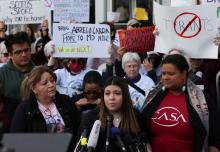
At some point this Easter Weekend, Christians will be reflecting on the final words that Jesus spoke from the cross, sometimes referred to as the seven last words of Jesus.
When I was younger, I was convinced that System of a Down’s “Chop Suey!” was a Christian song because lead vocalist and lyricist Serj Tankian incorporated Jesus’ final declarations into the song. But dissimilar to the order that Christians have typically arranged Jesus’ final words, the song first quotes the cry of reunion and then climaxes with the cry of dereliction.
Considering that the Roman Empire believed Jesus was a terrorist and crucified him as one, emphasizing the cry of dereliction seems apt.
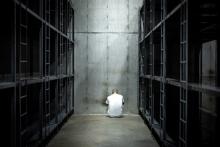
This past March, the Trump administration deported over 200 men to El Salvador to be held in the notorious maximum-security prison known as the Centro de Confinamiento del Terrorismo.
White House spokespersons have repeatedly claimed that these men — most of whom are of Venezuelan background — are members of the Venezuelan gang, Tren de Aragua.
However, multiple outlets have reported that neither the U.S. government nor El Salvador have provided any evidence to support these accusations.